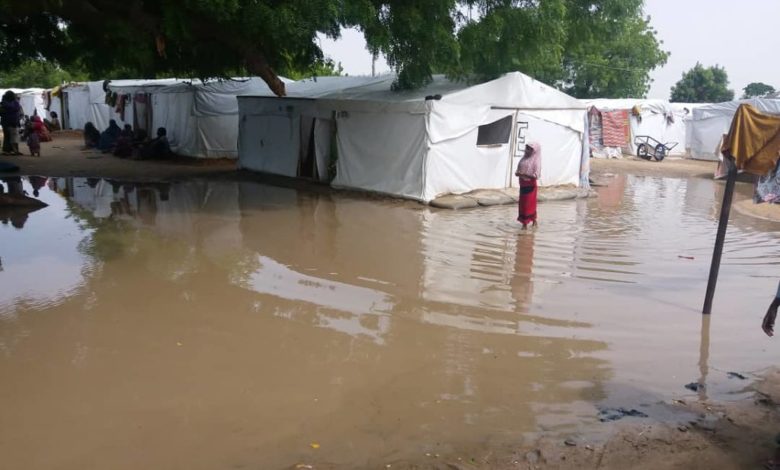Northeast: Humanitarian Stakeholders Brace For Impact Of Floods On Displaced Communities

The rainy season in northeastern Nigeria is associated with social and health problems for thousands of individuals displaced by the decades-old conflict in the region.
In Borno State, the epicentre of the Boko Haram insurgency, recent flash floods and windstorms wreaked havoc in Internally Displaced Persons (IDPs) camps, partially submerging shelters and increasing health risks for inmates.
The impact of flooding is exacerbated by overcrowding and poor drainage.
The International Organisation for Migration online displacement report between June 29, 2020 and July 3, 2020 revealed that 19 camps were affected in Maiduguri, Jere, Kaga and konduga local government areas of Borno State. Meanwhile, on July 12, HumAngle reported that flooding affected parts of the Bakassi IDPs camp, one of the oldest camps in the Northeast.
A source familiar with humanitarian operations and flood risks in Borno State said the Impact of flood was mostly on shelters some of which were more vulnerable than others because they were constructed on plain surfaces.
In June, the Borno State government instituted a committee to mitigate the impact of flood, The State Commissioner for Environment Modu Walama in a phone interview told HumAngle that the committee was going round to inspect most of the affected areas, including IDPs camps.
Walama added that the government was evacuating some blocked drains and desilting some areas to prevent flooding and would in addition build new drains in identified areas, particularly in IDPs camp areas, as a long term solution.
Eve Sabbagh, the Spokesperson for the UN Office for the Coordination of Humanitarian Affairs, told HumAngle that humanitarian actors were scaling up efforts to mitigate flooding and disease outbreaks during the rainy season as there were increased risks of flooding and outbreak of diseases such as acute diarrhoea and cholera.
“Aid agencies are ramping up preventive and response activities across Borno, Adamawa and Yobe states,” Sabbagh said.
In Pulka, Gwoza Local Government Area, humanitarian organisations distributed hygiene kits, including aqua tabs, soaps and oral rehydration solution to about 25,000 IDPs across five camps on Tuesday, July 21.
Ajso on July 20, Aid actors in Ngala Local Government Area on the border between Nigeria and Cameroon, started a “cash-for-work” programme and engaging over 300 IDPs in sand filling of water logs, clearing of drains and expansion of water channels to mitigate flooding which often cuts off parts of the area during the rainy season.
Sandbags are an important short- term flood mitigation technique that helps prevent, divert or reduce flooding, Walama said. He added that the government provided numerous sandbags in Mobbar, the headquarters of Damasak Local Government Area, in addition to ongoing work by excavators to mitigate the impact of flood due to the overflow of Komadugu Yobe River.
An estimated 175 newly constructed shelters are due for allocation this week to accommodate IDPs currently sleeping in the open
”The influx of new arrivals and the spontaneous erection of makeshift shelters has increased risks of flooding as, due to lack of space, some have been built along drainage channels,”. Sabbagh said.
‘’In Dikwa Local Government Area, over 25,000 displaced persons across five camps were affected by flooding in recent weeks,” the UN agency spokesperson said.
Prevention of disease outbreaks in camps is a concern for humanitarian actors.
Sabbagh revealed that aid actors had begun community mobilisation and awareness campaigns on the risks of flooding and disease outbreaks across the camps.
“Humanitarian partners have commenced malaria campaigns targeting over 52,000 children in Bama and Banki. It is a house-to-house campaign that will run for four months, with the distribution of preventive malaria drugs, including for children between three to 59 months,” the spokesperson said.
“Malaria accounts for 50 per cent of total consultations in health facilities in northeast Nigeria. In Borno and Yobe states, aid actors estimate that more than half of the morbidity and mortality are due to malaria, a proportion higher than all other causes combined, including measles, cholera and hepatitis E,” Sabbagh said.
Asked about government efforts in Kala Balge, where in November 2019, flood displaced 40,000 persons, including women and children, and damaged an estimated 4, 000 hectares of farmland and crops, the commissioner said arrangements were being made with security forces to protect personnel and equipment for work to be carried out in the area.
Support Our Journalism
There are millions of ordinary people affected by conflict in Africa whose stories are missing in the mainstream media. HumAngle is determined to tell those challenging and under-reported stories, hoping that the people impacted by these conflicts will find the safety and security they deserve.
To ensure that we continue to provide public service coverage, we have a small favour to ask you. We want you to be part of our journalistic endeavour by contributing a token to us.
Your donation will further promote a robust, free, and independent media.
Donate HereStay Closer To The Stories That Matter




